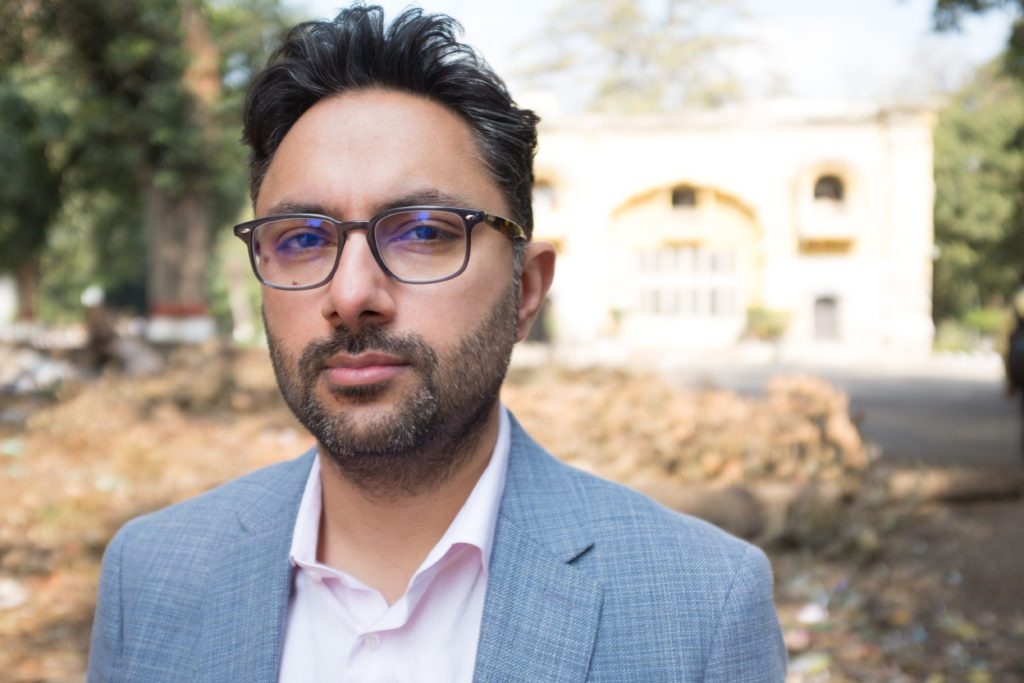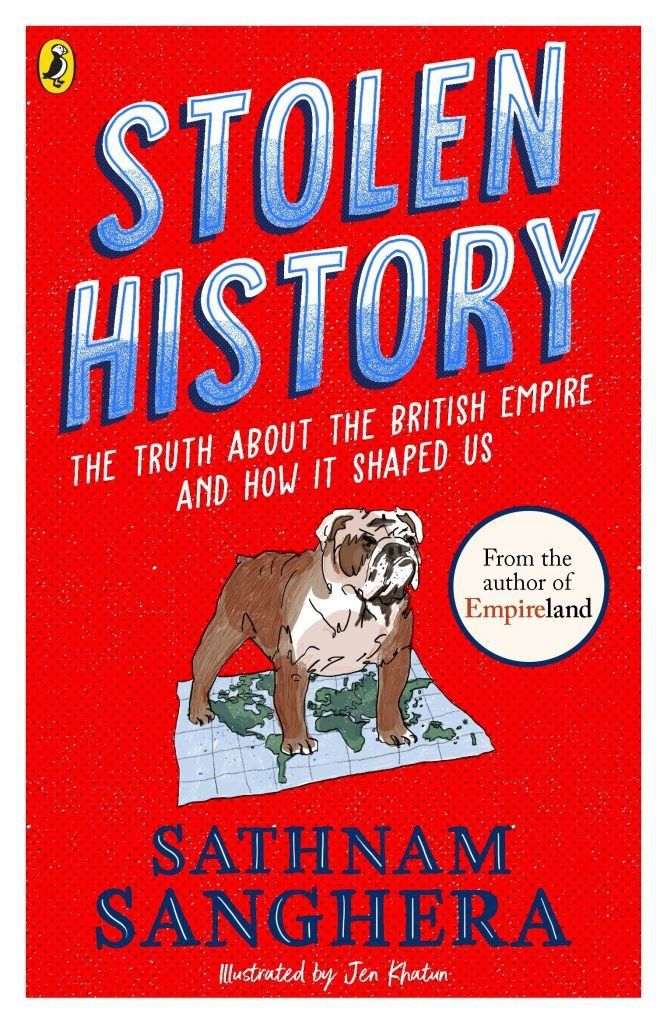
By: Pooja Shrivastava
Author Sathnam Sanghera’s new book on the British empire is aimed at younger readers and explains how the empire once made the country the most powerful on earth and how it still affects our lives in many ways.
Stolen History: The Truth about the British Empire is set to be published on Thursday (8). It is published by Puffin and has black and white illustrations by Jen Khatun, a children’s book illustrator of Bangladeshi- Indian heritage.
In an interview with Eastern Eye, Sanghera spoke about his idea behind the children’s book on a “complicated” topic, tackling a colonial mindset, the changing face of British politics and trolls.
“I was so late in learning the intricacies of British empire – I was in my 40s and I thought it would have been so amazing if I knew this stuff at school,” Sanghera, 47, said.
“As a country, every few years we have a racial crisis (whether it’s the murder of Stephen Lawrence or the Windrush inquiry) and the reports always say the same thing – we need to teach the history of empire better because then we will understand why we’re a multicultural country.
“But we never seem to get around to it. So, I thought to write about it rather than just waiting for the national curriculum to change that.”
With his new book, Sanghera hopes to make children understand it’s acceptable to have different views of the empire.
According to him, the UK is “not willing to address” its colonial past and also not letting young people learn about their history.
“I think it’s partly because we have an image of ourselves as a country that beats the evil racist Germans. We see ourselves as an anti-racist country.”
On the contrary, the British empire was proudly white supremacist for at least 200 years, Sanghera said, adding, “that’s a very difficult thing to come to terms with”.
“There’s some very difficult aspects of it, but also, there are some really positive things too. We are a multicultural country because we had a multicultural empire.”
Sanghera was born to Punjabi immigrant parents in Wolverhampton in 1976. He didn’t speak English when he began school, but went on to graduate from Christ’s College, Cambridge with a first-class degree in English language and literature. “I grew up with a narrative that was forced down my throat by Enoch Powell and our media that brown people came here uninvited to take advantage of the British – while the truth is that they actually came as citizens.

“People in Windrush came as British citizens as the Nationality Act of 1948 made them citizens. This is something we don’t understand as a country to such a degree that we’ve been sending Windrush veterans back – that’s the level of ignorance out there,” Sanghera said.
Starting as a columnist and feature writer, Sanghera published in 2009 his first book The Boy With The Topknot which was adapted for BBC Two in 2017.
His novel, Marriage Material, was shortlisted for a 2014 South Bank Sky Arts Award and a 2013 Costa Book Award; it was also adapted for the stage by playwright Gurpreet Kaur Bhatti.
His third book, Empireland: How Imperialism Has Shaped Modern Britain, became an instant Sunday Times bestseller when it was published in 2021. It was named Non- Fiction Book of the Year in Eastern Eye’s 2022 Arts, Culture and Theatre Awards (ACTAs). The book also led to Empire State of Mind, an acclaimed two-part documentary for Channel 4.
His upcoming book Stolen History is about sharing knowledge and facts from the past and is already creating a stir.
“Some people have already taken offence to the book even before I finished it, saying it is ‘vicious’. Stolen History refers partly to museums which are filled with loot from the empire and partly to this aspect of history that has not been explored and has even been concealed.
“I think the British empire went out of its way to conceal the evidence of what happened. A lot of the facts of empire were hidden and this is why suddenly we have an interest many years on.”
Sanghera spoke about the impact of empire on racism and its prevalence in society.
“To some degree, it has to do with the fact that the British empire as an institution was proudly racist.
Certain groups face more racism than others. I would say – British Hindus and British Sikhs probably face less racism than Africans and [those from the] Caribbean.
“Also, I think British Muslims face a huge amount of Islamophobia – if you have a Muslim name, your chances of getting a job are significantly less. And it’s proven that a huge number of black people who apply for the fast-track civil service scheme don’t get in. Clearly, we have issues there. We were dealing with black people in the same way in London as we were dealing with them in Kenya at the moment,” he said.
The May 6 coronation also led Sanghera to a few questions. He pointed out that the royal family decided they weren’t going to use the crown with the Koh-i-noor diamond because it was “controversial and the Indians want it back” – but added that the royals used some jewellery from South Africa, instead.
“It’s still a symbol of exploitation! You cannot ignore that history. Countries like Jamaica, Barbados or the Caribbean want to talk about the reparations and royal family doesn’t want to talk about it. The tension was so obvious, and it felt like at certain points during the coronation, it was going to kind of overflow,” Sanghera said.
Meanwhile, in British politics, Sanghera said despite a more diverse cabinet, Asianorigin politicians seemingly “can’t bring their full selves to their job” yet.
“I feel they have to play a game to go along with Conservative party politics. And if that’s the case, then we have this very depressing state of affairs. It’s depressing for me that you can get to the top in British politics nowadays if you’re brown, but only if you agree to leave everything unchanged when it comes to racism.”
He, however, conceded he did not think he would see an Asian prime minister in his lifetime. “So I do think we’ve got to applaud the fact that it’s happened. It’s still a good thing that we have a more diverse cabinet.”
Discussing ways to move forward, Sanghera said making changes in the curriculum would not have much of an effect “because kids are educating themselves through podcasts anyway”.
He added, “I would love to see Britain engaging positively with the Caribbean countries about reparations. They’ve made the request in 2013 and we still have not really responded to them.

“We need to engage if we’re trying to redefine our role in the world after Brexit. We need to engage with Barbados, Jamaica and Ethiopia about loot. We need to engage with India about some aspects of colonialism. I would like to see a change in the way we deal with the world, because that itself would change the way we deal with this issue again.”
Sanghera has one more book in the pipeline, after which he is considering taking a break from this “stressful subject”.
“I feel that I’ve been reading a lot of history books, and I’m becoming a worse writer. I want to be creative, and I’d like to do some creative writing again,” he said. “I need to stop at some point – it’s a very stressful subject to talk about and also because I get so many trolls and threats.
“I get trolled quite a lot on social media; I get a lot of angry letters. I actually have more or less stopped doing events in Britain because people sometimes shout and hurl abuses at me during such occasions. All this stresses me out.”
Despite being an “overwhelming, controversial and stressful” subject, Sanghera said talking and writing about colonialism has given him “a real sense of purpose”.
“When I started writing this, I did it for myself. I just wanted to learn about it. And now Empireland is used as a teaching resource in lots of schools. I have conversations with former prime ministers about this. I have lectured diplomats and government departments. I know there’s huge demand for this, because the level of knowledge is quite low.
“Even though it comes at a personal cost to me, I feel like it really matters and I am making a difference. And that’s what keeps me going,” he said.
